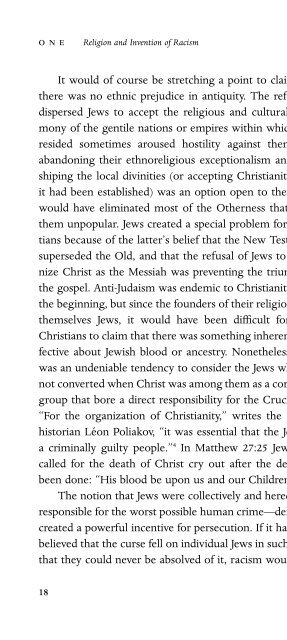Racism - A Short History - George M Fredrickson.pdf - WNLibrary
Racism - A Short History - George M Fredrickson.pdf - WNLibrary
Racism - A Short History - George M Fredrickson.pdf - WNLibrary
Create successful ePaper yourself
Turn your PDF publications into a flip-book with our unique Google optimized e-Paper software.
ONE Religion and Invention of <strong>Racism</strong><br />
a person of faith should be the slave of no one but God<br />
himself, the chattel servitude of a genuine believer could<br />
be troubling. To maintain that the state of the soul had no<br />
necessary effect on earthly status was an ancient Christian<br />
doctrine, but it was losing its force in the face of the Puritan<br />
revolution and the rise of radical Protestant sects such as<br />
the Quakers and the Anabaptists. In this more egalitarian<br />
climate of religious opinion, making a heathen background<br />
the legal basis for slavery was another way of asserting innate<br />
difference and thus resisting the homogenizing effect<br />
of baptism. As in the case of antisemitism a conflation of<br />
religion and race in the popular mind would prepare the<br />
ground for the more explicit and autonomous racism that<br />
would emerge in the eighteenth and nineteenth centuries. 56<br />
One can therefore trace the origins of the two main<br />
forms of modern racism—the color-coded white supremacist<br />
variety and the essentialist version of antisemitism—to<br />
the late medieval and early modern periods. Since the<br />
idiom of this period was primarily religious rather than naturalistic<br />
or scientific, it could only be through some special<br />
act of God that some peoples could have been consigned<br />
to pariah status or slavery. But any such invocation of what<br />
might be called supernaturalist racism came into conflict<br />
with the main thrust of Christianity—the salvation of the<br />
entire human race, which, according to the New Testament,<br />
was of “one blood.” It was because he argued from<br />
this perspective that Las Casas was more persuasive than<br />
Sepúlveda. On a popular level the great curses served to<br />
make it easier for Christians to treat other human beings<br />
as less than human. Europeans might seek to affirm their<br />
status and self-worth through the allegation that the blood<br />
46
















